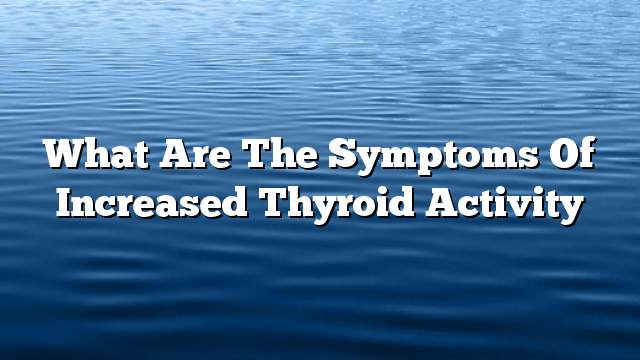Thyroid
The thyroid gland is a butterfly member located at the base of the neck, releasing hormones that control metabolism, the way the body uses energy, and thyroid hormones help regulate vital body functions, including breathing, heart rate, peripheral nervous system Central, body weight, muscle strength, menstruation, body temperature, cholesterol levels, and many more.
Thyroid is part of the endocrine system, a group of glands that produce, store and release hormones in the bloodstream so that these hormones can reach the body’s cells. The thyroid gland uses iodine from a person’s foods to build two major hormones: triodothyronine (T4) It is important that the levels of these hormones remain at the normal level without increasing or decreasing, and that is by connecting two of the brain glands, namely the hypothalamus, the pituitary gland, and the hypothyroidism secrete the absolute hormone of the hormone alarm clock Of the thyroid (TRH) For the pituitary gland refers to the thyroid gland to produce more or less than T3 and T4 by increasing or decreasing the secretion of the hormone called thyroid stimulating hormone (TSH).
Increased gland activity or so-called Hyperthyroidism (T3 / T4), which accelerates metabolism in the body, leading to nervousness, anxiety, rapid heartbeat, weight loss and many other symptoms.
Symptoms and signs increase thyroid activity
Symptoms vary from signs, symptoms are felt by the patient, signs of the disease are observed by others or the doctor on the patient, if the patient suffers from hyperthyroidism may encounter some of the following symptoms:
- At the beginning of the disease increases activity.
- Mood swings – such as anxiety, irritability and nervousness.
- Difficulty sleeping (insomnia).
- Feel tired all the time.
- Muscle weakness.
- Need to remove stool or urine more often than usual.
- Excess fat in the stool, which can make them greasy, and difficult to get rid of in the toilet (steatorrhoea).
- Sensitivity to heat, excessive sweating.
- Uncertain or unexpected weight loss, although there is an increase in appetite in a few cases, an increase in appetite can lead to weight gain.
- Problems in the menstrual cycle, it is possible to delay or accelerate or even stand completely.
- Infertility and loss of interest in sex.
- For diabetics, symptoms such as extreme thirst and tiredness can worsen due to hyperthyroidism.
- Shiver in the hands.
The physical signs are:
- Swollen neck caused by thyroid enlargement.
- Heart palpitations and heart rate are irregular and / or unusually fast.
- Fibrillation or shaking hands.
- The warmth of the skin and its moisture.
- Redness of the palm of the hand.
- Loss of nails out of nail.
- Urticaria, a form of rashes.
- Incomplete hair loss (alopecia).
- Tingling and dimming of the face and limbs.
Causes of increased gland activity
There are a variety of conditions and diseases that can cause hyperthyroidism, such as: Graves disease, an autoimmune disorder, the most common cause of hyperthyroidism, so that the body produces antibodies that stimulate the thyroid gland to secret many of its hormones, Graves disease often occurs in women more than men, and tends to be in captivity, suggesting hereditary causes, so tell your doctor if a relative has the disease, and other causes that can cause hyperthyroidism Thyroid activity includes:
- Iodine overload, a key element in the T4 and T3 industry.
- Thyroid inflammation that causes leakage of T4 and T3 from the gland.
- Ovarian tumors or testes.
- Benign tumors in the thyroid or pituitary gland.
- Eat large amounts of tetraudothronine taken through dietary supplements or medications.
Diagnosis and treatment
Thyroid hyperthyroidism is diagnosed based on symptoms, clinical examination, blood tests to measure levels of thyroid stimulating hormone (TSH), and thyroid hormones T3 and T4. The doctor may also require additional tests, such as ultrasound, nuclear medicine, To see if he has nodules or swelling, or whether the gland is inflamed.
The treatment of hyperthyroidism is in anti-thyroid drugs that interfere with the production of thyroid hormones (primarily methimazole). Another option is radioactive iodine therapy, which destroys cells that produce thyroid hormones. In some rare cases, In which patients respond to these drugs or are exposed to the side effects of these treatments, surgery is performed to remove the thyroid, either part of the gland or all, and the choice of treatment depends on the underlying cause of the symptoms, in addition to some other criteria such as age, Patient Pregnant, or the incidence of certain diseases that may affect or be affected by the necessary drugs and treatments of the gland. In addition to these treatments, the doctor may also prescribe beta blockers to prevent the effects of thyroid hormones in the body. For example, beta blockers help slow the rapid heart rate and reduce hand tremors.
